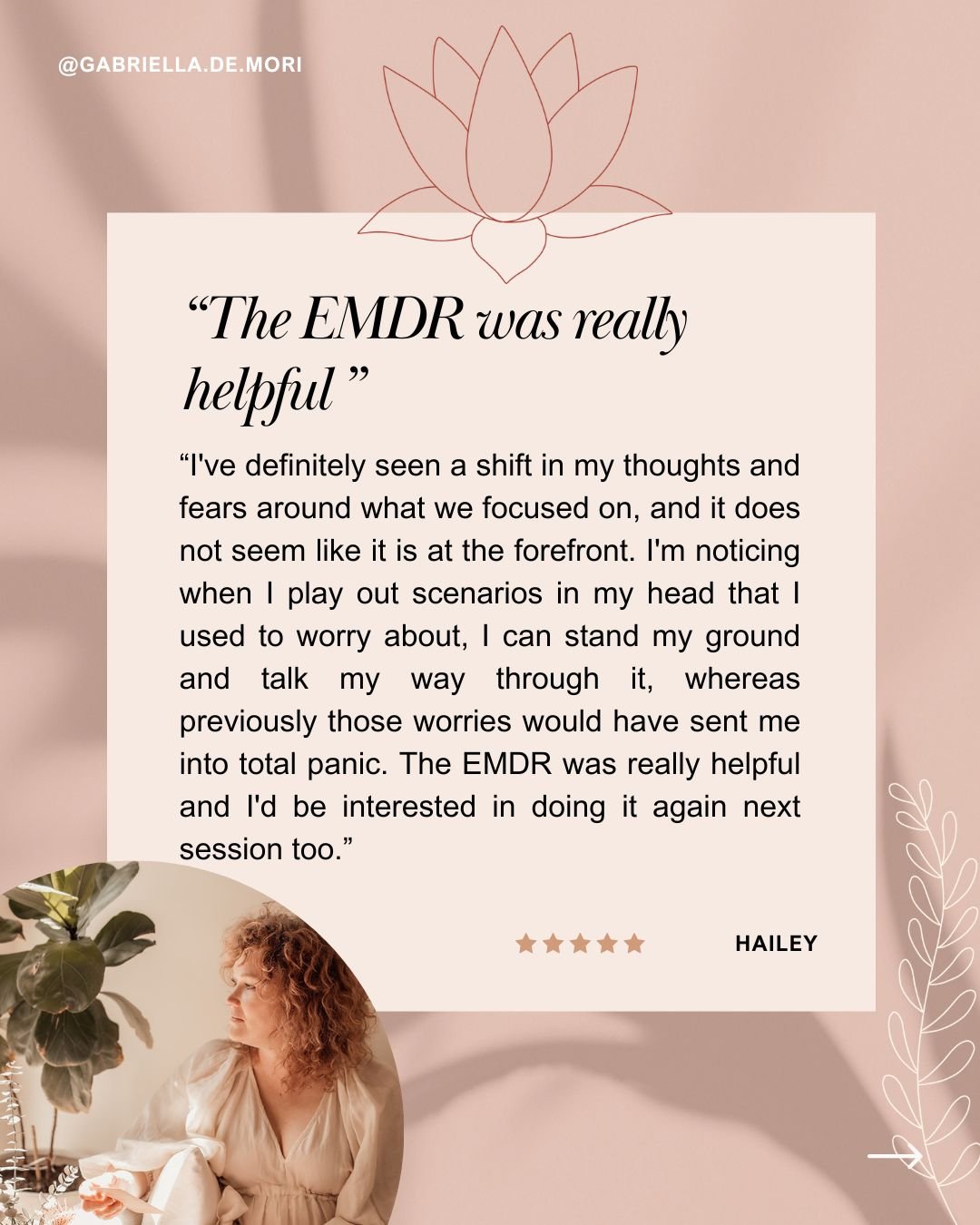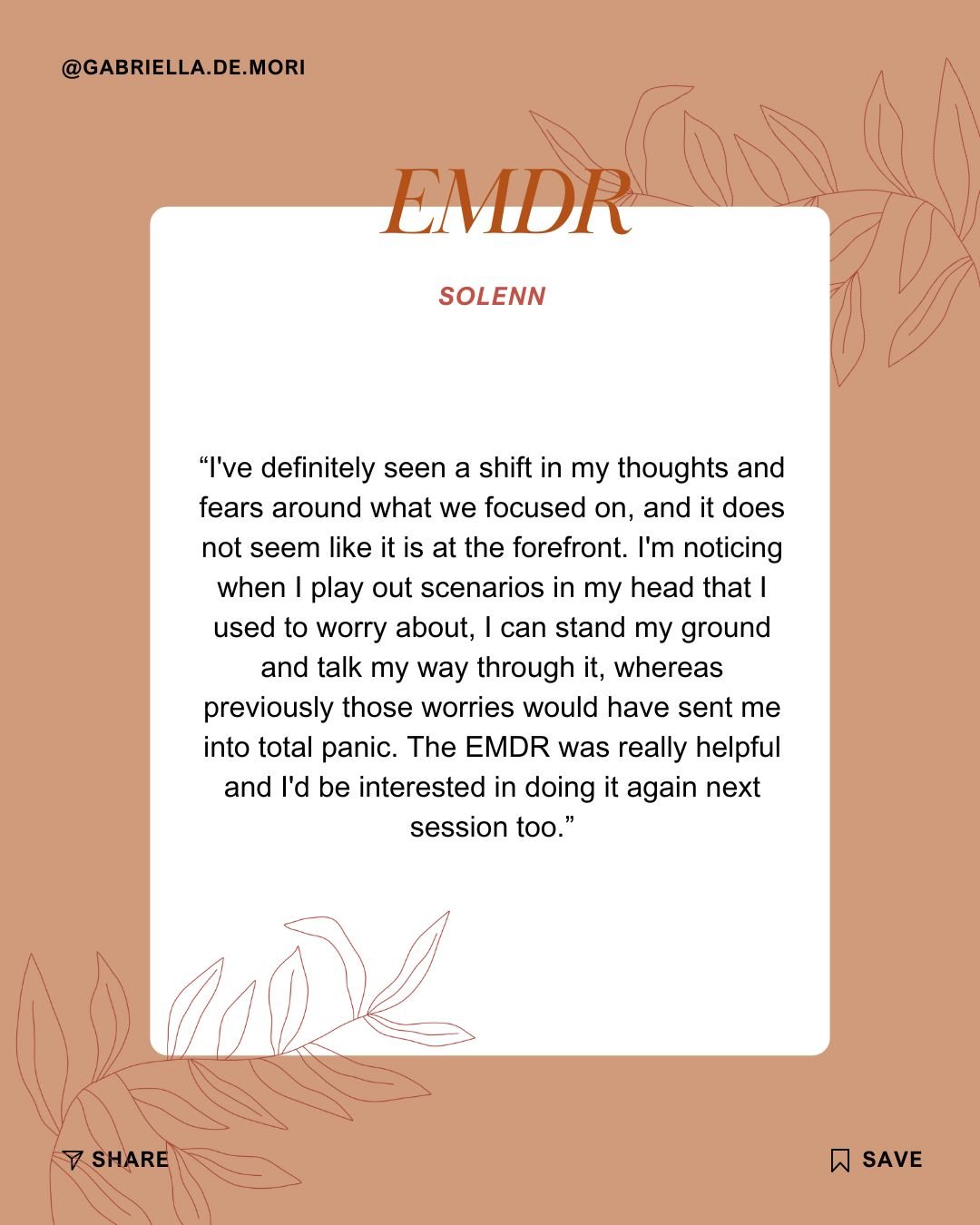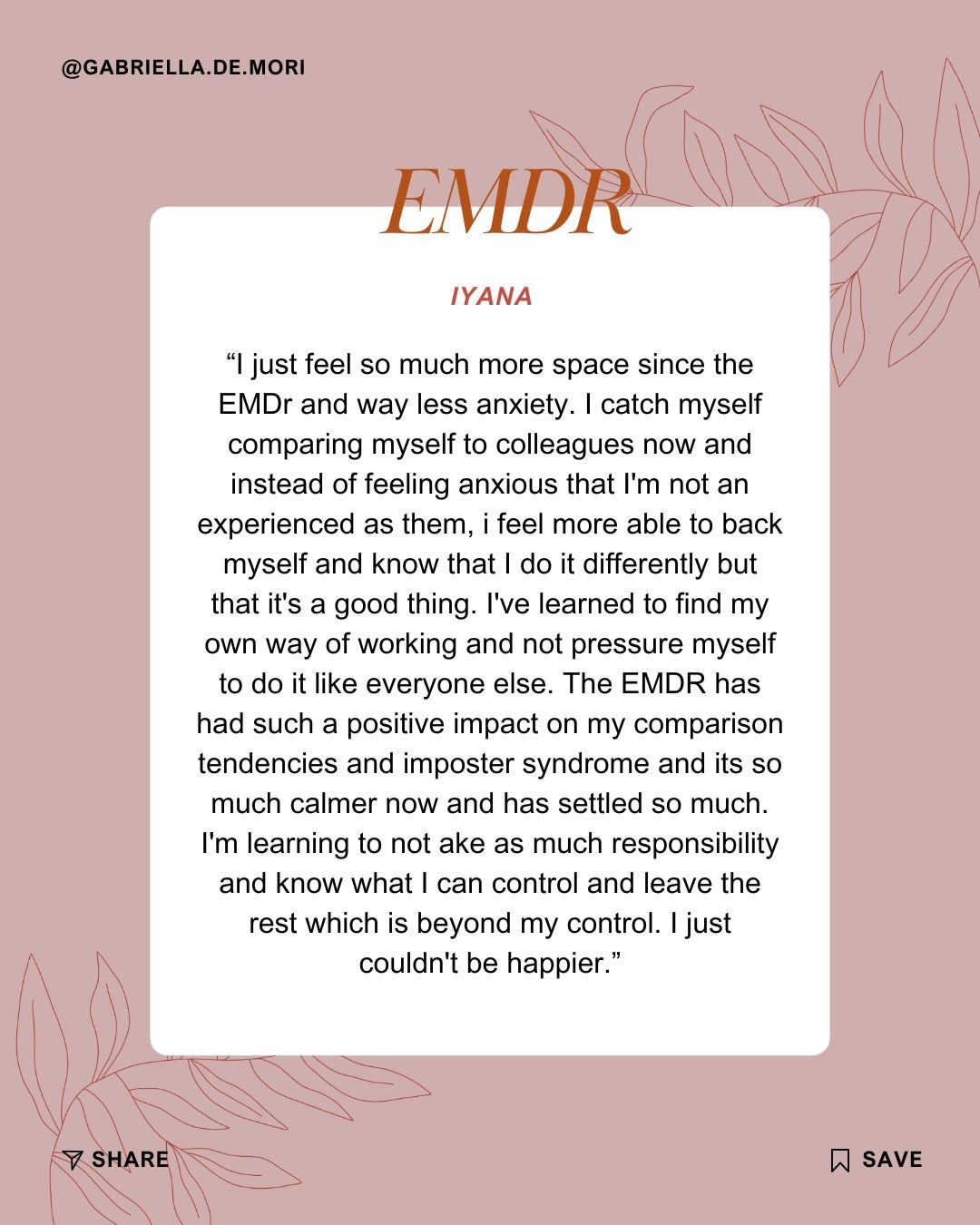
EMDR Therapy in Perth

What is EMDR?
Eye Movement Desensitisation and Reprocessing (EMDR) is a psychotherapy method developed over 30 years ago, that is now the first-line recommended therapy approach for treating trauma, anxiety and depression.
EMDR specifically targets strong physical responses, deep emotions and negative beliefs about yourself, relationships and the world, which can be life-changing.
We have several experienced EMDR therapist passionate about this modality and it’s transformation results.
It truly is like no other therapy experience.
EMDR is a journey toward reclaiming one’s story and finding peace within.
What is EMDR used to treat?
Although it was originally intended to treat Post Traumatic Stress Disorder (PTSD), EMDR is now widely used to successfully treat a range of conditions.
EMDR is a powerful, transformative therapy for healing the wounds of trauma. These experiences often leave behind heavy burdens and deeply ingrained beliefs like “I’m unworthy,” “I’m unlovable,” or “I’m powerless.”
EMDR gently guides individuals through these painful memories, helping to untangle the emotional weight and reframe these beliefs into ones that affirm self-worth, love, and strength.
EMDR can dissolve the lingering shame and fear, restoring a sense of safety within.
In relationship trauma—whether in love, friendship, or family—EMDR brings clarity and compassion, allowing old patterns of mistrust and pain to give way to new pathways of connection and hope.
-
Trauma, including attachment and betrayal traumas
Childhood & Adult Trauma
Single or recurring distressing events
Intrusive memories, nightmares, flashbacks
Intrusive and involuntary traumatic memories
Disturbing dreams/nightmares about traumas
Strong physical or emotional reactions triggers
Flash-backs and Flash-forwards (Future phobias or anxieties)
Grief and loss
Adjustment Challenges
-
Generalised anxiety
Phobias and social anxiety
Panic attacks
Performance anxiety
Sexual anxiety
Safety Anxiety
Post-Partum Anxiety
-
Depression
Low or irritable mood, difficulty sleeping, or problems concentrating
Diminished interest in doing things you normally enjoy
Deep sadness, regret or guilt.
-
Strong Inner Critic
Self-esteem issues
Negative self-beliefs and poor self-cognitions such as “I’m unworthy/ unloveable/ disgusting”
Self-blame beliefs such as “I deserved it/ Bad things always happen to me.”
Deep emotions of hurt, regret, guilt, shame and self-criticism.
Recurring self-defeating patterns of behaviour and negative thinking.
-
Negative self-beliefs and such as “I’m unworthy/unloveable/disgusting”
Self-blame beliefs such as “I deserved it/ Bad things always happen to me.”
Deep emotions of hurt, regret, guilt, shame and self-criticism
Anger outbursts.
Broken trust, and fear of others and the world in general.
Lingering shame and fear, and deep regret.
Sexual Pain or sexual anxiety.
How does EMDR Therapy Work?
When trauma occurs, our body's fight-or-flight response is activated to help us survive. However, trauma can sometimes prevent the brain from fully processing these events, keeping the stress response on high alert. Sights, sounds, or smells linked to the trauma can then become distressing triggers.
During Eye Movement Desensitisation and Reprocessing (EMDR) therapy you’ll be gently guided to recall these “trapped” or “buried” traumatic memories by engaging in bilateral stimulation, like side-to-side eye movements or gentle tactile touches. This helps the brain reprocess these distressing memories, detaching them from the stress response and related triggers so that they can be “reprogrammed” with new, positive beliefs.
Over time, these memories become less distressing, allowing you to remember the event without experiencing severe emotional discomfort. This allows natural healing to occur, easing the emotional distress while the memory remains. With PTSD symptoms reduced, other related conditions often improve as well. After EMDR therapy clients often tell us they feel relieved as the intense images, distressing sounds, and painful emotions associated with the memory are softened.
What Does an EMDR Session Look Like?
EMDR therapy is conducted through a series of sessions with a trained therapist, each lasting 60-90 minutes. The number of sessions needed depends on your progress. During EMDR, your therapist will guide you to recall traumatic memories, along with the associated thoughts, feelings, and sensations, while engaging in bilateral stimulation.
As you recall specific traumatic events, your therapist helps you shift focus toward more positive thoughts, aiming to resolve the negative emotions linked to the event. EMDR is usually not introduced in your first session, as your therapist will first prepare you to ensure you feel comfortable and ready.
-
Your therapist begins by gathering information about your past and determining if EMDR is suitable for you. This includes discussing disturbing events and memories you'd like to address and setting goals for your therapy.
-
Your therapist will explain what to expect during EMDR sessions and provide tools to help you feel stable and safe. They’ll also equip you with techniques to manage your emotions as you progress.
-
Together, you and your therapist will identify themes and specific memories to work on. You’ll explore both negative beliefs tied to the trauma and positive beliefs you wish to adopt.
-
Your therapist helps you focus on specific negative images, thoughts, feelings, and body sensations related to the trauma. Through bilateral stimulation, you'll notice how your feelings and thoughts evolve until the distress is reduced.
-
Your therapist will help you focus on positive beliefs about yourself or the world, aiding in the shift of your internal beliefs moving forward.
-
You’ll focus on how your body feels when recalling the negative memory. The goal is to decrease any physical symptoms until they are neutralised, signalling the completion of reprocessing.
-
Your therapist ensures you feel calm and safe before ending the session. They’ll discuss what to expect between sessions and may ask you to note any new thoughts about the memories for discussion next time.
-
In this final stage, your therapist reviews your progress, assesses any changes since starting therapy, and determines if more sessions are needed. They’ll help you prepare for future challenges with the insights gained from your EMDR experience.
Who is EMDR suitable for?
Although EMDR is now used for various conditions, its primary strength lies in treating anyone with trauma-based problems.
Individuals who have experienced various forms of trauma, whether from a single distressing event or a series of accumulated negative experiences. Trauma is both the things that happen to us, in front of us and the things that don’t happen to us, causing neglect, abandonment and isolation.
Individuals who feel strong physical sensations, such as anxiety or low mood, panic, distress, overwhelm and or triggers.
Individuals who don’t want to over-analyse their trauma or recount their stories in-depth, but are ready to re-process them and move on.
Individuals who are ready to let go of their past traumas desire to have more positive self-beliefs and self-talk and are ready to process and address their traumatic experiences.
Our Perth-Based EMDR Therapists
Gabriella de Mori
Registered Counsellor
Gabriella is the practice owner and principal. She is a dynamic, spirited and warm-hearted registered therapist with a Master's Degree in Counselling from the reputable Notre Dame University. She has ten years of experience and uniquely incorporates a body-mind approach into all her sessions to guide you to go within and support your Inner World.
Jo Bealey
Registered Counsellor
Jo is a qualified psychotherapist, with extensive specialist training. She supports women, mums, new parents, couples, and young families using EMDR, emotion-focused, and attachment therapies. Jo helps couples reconnect and overcome life stresses to rediscover their emotional bonds, providing holistic support for stress, anxiety, depression, trauma, and relationship issues.
Kylie’s approach is warm, non-judgemental and trauma-informed, with a deep respect for all the parts that have helped you cope on your journey here. Over the past 5 years, Kylie has worked with individuals, families, and groups in community clinics, private practice, and hospital (in-patient and day-patient) settings. Kylie has gained so many invaluable insights into such diverse experiences of mental health.
Kylie Grills
Registered Psychologist
Jen is a warm, non-judgmental therapist who integrates various therapeutic modalities, including Mindful/ Compassion/ Somatic Self-Inquiry, CBT, EMDR, and Mindfulness, to foster self-compassion and resilience. She creates a safe space for clients to explore their inner worlds. Jen is also a sexologist with a Masters Degree in Sexology.
Jen Vellios
Registered Psychologist

EMDR at Gabriella de Mori & Co.
At Gabriella de Mori & Co, EMDR therapy is provided by trained therapists in a supportive, safe environment. Your therapist may suggest EMDR if it suits your needs, explaining the process beforehand. This evidence-based method is used to help clients address mental health issues and build emotional strength.
You can discuss trying EMDR with your therapist or book a session directly.
Feedback on EMDR therapy with our registered counsellor Gabriella de Mori.








Get in Touch
Contact Gabriella de Mori & Co. and let us guide you on your therapeutic journey.


Get in touch
Contact Gabriella to discuss working together. I’ll guide you to which therapist is most suitable for you and your needs.
Stay in touch
Connect with us on social media for soulful resources.








